During these unprecedented times, the topic of inequality has been of particular interest. With the COVID19 pandemic disproportionately affecting Black Americans, as well as the protests fueled by the murder of George Floyd, we cannot ignore the role that race plays in all sectors of life, including the business world. Entrepreneurship can be a platform in which everyone can succeed and thus by supporting minority owned small businesses we as a society can benefit the whole. Efforts like this are just the tip of the iceberg but are a small step in the right direction. It is also important to remember how the value of diversity in the workplace can benefit not only the business, but also our world. Supporting businesses is thus not about giving charity but about benefiting ourselves as well.
Before we can dismantle the biases that disrupt access to equal opportunity and objective decision making, it is important to understand how those biases come to be. It is also useful to differentiate between being biased and being racist.
Implicit Biases
Implicit biases are natural as we are all more comfortable with what we deem to be similar to our self. However, we can develop the emotional maturity to not allow this to make us racist or impact our decision making ability across our life, relationships, and business. As a society it is in our benefit to do so, because the world and our own success is greater when others are more successful and when we make decisions that are more objective.
By definition, implicit bias refers to the attitudes or stereotypes that affect our understanding, actions, and decisions in an unconscious manner. These biases can be both favorable and unfavorable assessments, but either way, they happen without a person’s awareness or intentional control. On a more basic level, implicit biases are inherent biases we have as humans, and we cannot escape them in almost all aspects of our life. Biologically, we tend to look for commonalities, and tend to feel a sense of uncertainty or bias to that which we perceive as different or unfamiliar. As a result of this discomfort with the unfamiliar, we may have unconscious feelings and attitudes about other people based on characteristics such as race, ethnicity, age, and appearance. These associations develop over the course of a lifetime starting at a young age and become more and more ingrained with repeated exposure. This is normal and does not by itself make us racist as implicit biases are universal: every individual possesses them.
However, the implicit associations we hold does not have to align with our declared beliefs and may not reflect stances we choose to explicitly endorse if we are mindful about these biases and thus consciously decide to make more objective and optimal decisions. The problem is that to be more objective we must be emotionally mature both as individuals and in our group-thinking mentality otherwise these implicit biases drive behavior in the real world.
The most important and optimistic characteristic of implicit biases is that they are malleable. Our brains are impressively complex structures, and the implicit associations that we form can be gradually unlearned through active efforts to dismantle them. Therefore, we need to train ourselves to be objective. Biases in all aspects of our lives can hold us back from making the best decisions for ourselves whether it be in relationships, with society, or in business.
As mentioned, having biases does not make us racist or bad people – being racist is more of a conscious belief that a particular group does not deserve the same opportunity and is more of a notion of inequality than discomfort caused from unfamiliarity. In other words, racism can be defined as the belief that when implicit biases are directed to a specific minority group in a disadvantageous manner, the actions that result from this are justified. Not growing up and taking ownership for actions that do result in a direct disadvantage to one group of people is the sign of immaturity. While it may not be easy to rise above these biases, we as a nation and a human race need to demand this from ourselves for the better of us all. A really good book that I strongly recommend which influenced my understanding of this difference is Blindspot – Hidden Biases of Good People.
The Law of Abundance
Biases serve no real purpose, especially in the business world. They hold us back from making optimal decisions and progressing society in an optimal way compared to if we could make decisions that weighed all the facts up objectively. One mindset that is important to adopt is that others do not have to be worse off for me to be better off. This win-win attitude follows the law of abundance: there is ample money and opportunity to go around as it is not a fixed unit. Proof of this is that there is always room for a new concept to do well and often when everyone is doing well they will also be spending more and thus more money and opportunity is going around. Thinking the opposite is a scarcity mindset that is not productive and not healthy for oneself. This scarcity energy also tends to result in more scarcity in our own lives. Win-lose relationships are never sustainable, and I personally will not spend effort on being in a partnership in which the other person is not benefited (because I know it will not last). The well-known book, 7 Habits of Highly Effective People talks about this win-win attitude in more detail and I highly recommend reading it if you have not as I draw a lot of advice I give clients from this book, and I believe it relates well when understanding the value of diversity in the workplace.
Unfortunately, humans do not all have the required level of emotional maturity to prevent biases from causing us to make poor decisions. Additionally, group-thinking will typically have a lower level of emotional intelligence than at an individual level, and thus in the long term this leads to a systemic racial problem, unequal access to opportunities, and a sizable wealth gap. Rather than letting biases uproot the law of abundance, we should be working to reinforce it. As entrepreneurs, we are no strangers to hard work. So, let’s follow the law of abundance, decide to become wealthy, believe we have the ability to do so, act accordingly, and reap what follows! But more importantly, let us realize that others can do the same at no cost to us.
What is the Value of Diversity in the Workplace and in Society?
The value of diversity in the workplace through inclusion can be hugely advantageous. Firstly, a problem approached by different minds with their own unique backgrounds increases productivity and allows everyone to view things from a different perspective. By sharing ideas, your team will be able to provide better and more collaboratively formed ideas that attract the widest audience: improving ability to scale growth more efficiently. The combination of these various perspectives can also increase creativity by forming a novel way of looking at a problem.
Most importantly, a culturally diverse workplace can help us actively dismantle some of our implicit biases. Employees operating in a diverse workforce spend higher amounts of time in their day to day life with people from cultures they may not commonly be exposed to. Simply engaging with their fellow employees can allow them to adopt new cultural insights, and subsequently reduce negative biases.
Lastly, as mentioned above, the more people that are successful, the more we can make ourselves given affordability and spending goes up across the board.
An Entrepreneur’s Responsibility
As entrepreneurs with a unique chance to create equal opportunity and a personality that is driven by instigating change, it is our duty to be leaders in this realm. AngelytiX’s mission is to help small business owners take control of their own destiny by providing access to the necessary skills and experience that most business owners do not automatically have. We are also proud to have helped small business owners across numerous minority groups.
As entrepreneurs, we are responsible for making the active effort to deconstruct our implicit biases and adopt a win-win mindset while helping others and enhancing the whole. The value of diversity in the workplace cannot be understated.
Best,
Lawrence Brown
Business Consultant | AngelytiX Consulting





